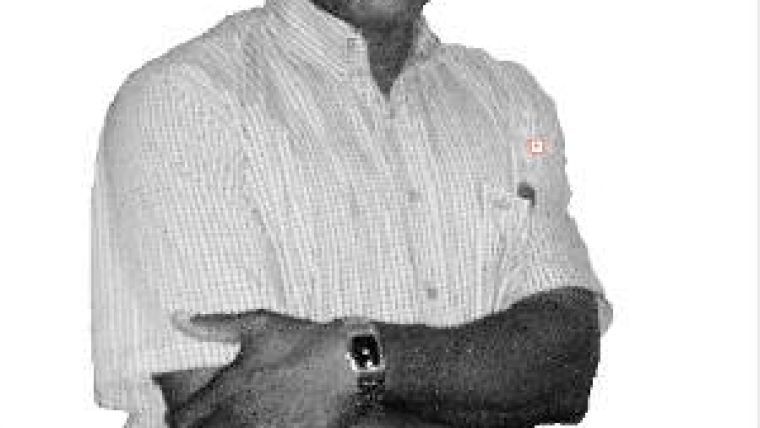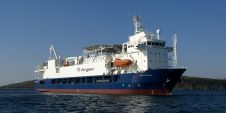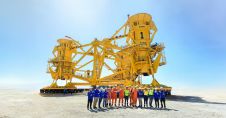Maritime Authority in the Caribbean
Hydro International Interviews Freddy Delchot
Having learned of the tremendous effort made by the Maritime Authority of Suriname, led by Mr Michel Amafo, in developing its hydrographic service, Hydro International now has the pleasure of offering its readers an interview with the hydrographer of the country. The words of Mr. Freddy Delchot (hydrographer) clearly show us that he is fully aware of the benefits obtained for a developing country from a hydrographic service, membership of the IHO and active participation in the activities of the Regional Commission of that organisation. Also important are the advantages that can be obtained from an intelligent co-operation with industry. You may also appreciate that the head of MAS, Mr Michel Amafo, considers the hydrographic service to be a key factor in increasing the maritime commerce and maritime safety.
Mr. Delchot you are the manager of Nautical Affairs and the hydrographer at the Maritime Authority of Suriname. Can you please tell us a little about your background and how you attained this important position in your country?
I was born on 3 December 1957 in Paramaribo. In 1979, I joined the University of Suriname as a geodetic assistant, after having completed secondary vocational training in Land Surveying. While studying Geodesy at that same institution, I had to fulfill my military service in 1981. In 1982, I joined the University of Suriname again and in 2000 I successfully completed a study in Public Administration at the Faculty of Social Sciences there. After 23 years of service at the University of Suriname, I was appointed head of State land Office in 2002. In 2008, I joined the Maritime Authority Suriname as manager Nautical Affairs which is what I still do. During this period I completed a Masters degree in Public Administration and followed several courses, such as Basic Hydrography, Dredging Techniques and Management. I am married and have four children.
On reading the report given to the MACHC last November, it appears that the Hydrographic Service in your country is responsible for sea coastal waters, the port areas and the internal waters. What are the means at your disposal to carry out this task?
We have legislation, equipment and well trained employees at our disposal.
The equipment consists of 2 survey vessels with single-beam echo sounders, the Marwina for coastal surveys and the Pasisi for inland surveys. We have the disposal of Sound Velocity, RTK and use HYPACK Software.
Speaking about MACHC, how does MAS look at its own role in the Caribbean? How do you percieve the specific challenges of that complex region (many small states, possibility of boundary disputes treated at political level, and many problems related to the marine environment defence)?
Speaking about the MACHC is speaking about a common goal, namely, safety of navigation within the region. MAS clearly sees its role in the Caribbean as being the best maritime authority in the region. It is a challenge to make an optimal contribution to the goals of the MACHC but we want to play a more active role by promoting technical co-operation, exchanging information and strengthening our hydrographic capabilities. In my perception, challenges specific to the Caribbean should be approached by co-operation within the CARICOM or co-operation between CARICOM and MACHC would be considered.
From the report cited above it seems that the Hydrographic Service is also responsible for planning the aids to navigation. Can you describe how this task is carried out? Do you also have the responsibility for their maintenance?
Planning the aids of navigation is carried out in collaboration with the Fleet and Maintenance Department. This activity takes place after the pilot service has reported difficulties with aids to navigation. The positions are determined in advance on a chart. Buoys or other aids are placed with the assistance of the hydrographic department, which determines the positions in the water. The hydrographic department is not responsible for the maintenance of the aids to navigation.
The Republic of Suriname is the smallest country of South America, nevertheless, its coastline has a length of more than 300km and if one includes the internal waters, the effort required appears considerable. In which way do you obtain the resources needed to satisfy this requirement?
The MAS is a statutory body, which generates its own means to operate by the piloting of sea-going vessels, offering hydrographic services to private companies and imposing various levies on ports, jetties and loaded goods.
Every sea-going vessel with a weight of more than 500grt needs pilot assistance. Piloting involves the guiding of a ship through the narrow and shallow waterways of the Surinamese rivers. A river pilot guides vessels inside the coast of Suriname.
Suriname is committed to the defence of the natural environment. In what way does the hydrographic service contribute to this?
The hydrographic service contributes by participating in an Integrated Coastal Zone Management Programme. It also participates by having representatives at various ministries and institutions including the Ministry of Labour, Technological development and Environment, the University of Suriname and the Environmental Authority. The hydrographic service also involves the Environmental Authority in other activities under the supervision of the MAS (eg. dredging).
Has Suriname claimed the extension of its continental shelf beyond the 200nmiles. If so, was the hydrographic service involved in the needed survey effort?
Yes. The hydrographic service was involved in the determination of the baseline and conducted surveys in the coastal zone up to a depth of 10 metres. The remainder of the necessary survey effort was carried out by a private company hired by the State Oil Company.
Suriname is a member of the IHO and of the above mentioned Hydrographic Commission. What are the benefits of these memberships to the hydrographic service? In particular, what is your opinion about the help that the IHO Capacity Building Committee can give to the developing countries?
The membership of the MACHC allows us to participate in the capacity building program. Hydrographic agencies should benefit from the aid which the IHO Capacity Building Committee offers to developing countries. Applying knowledge is very important. Often, developing countries are incapable of purchasing the necessary equipment. It would be good if attention is also paid to this.
In the IHO Year book your service is reported to have produced 8 nautical charts in co-operation with The Netherlands Hydrographic Office. Do you plan to increase this number? If so, which areas need to be charted? Are these charts also produced in the form of Electronic Navigational Charts in accordance with the IHO standards?
We have not planned to increase this number. We have planned to co-produce the nautical chart with the numbers 2014, 2017, 2218 and 2228. None of the charts are officially produced in form of ENC following the IHO standards. The approaches of the Corantijn and the Suriname River have been produced in the form of ENC by the UK Hydrographic Office.
Since 1984 private industry has started producing electronic charts on the basis of the official charts that each coastal state produces and under payment of the related royalties. When GPS became operational in 1996 the use of the electronic charts was considerably extended and this gave private industry more chances to flank the government institutions and make good business. How do you see this type of participation by private industry in the hydrographic activities?
I see this type of participation by private industry in hydrographic activities as an opportunity for hydrographic offices to get acquainted with the latest developments in the field of hydrographic instruments and data processing.
Your service is a component of the Maritime Authority. How does that Authority value the support that hydrography can give to the maritime operations?
The support that hydrography can give to the maritime operations is highly valued because hydrography fulfills a very important role in maritime operations. Many maritime operations could not have taken place without the availability of hydrgraphic data. It is important that the data is up-to-date and reliable.
Do you think that there is space within the MAS to create jobs for young people who would like to work in hydrography? If so, where and how can they be trained?
I think there is space within the MAS to create jobs for young educated people as the activities increase. They can be trained on the job in basic hydrography but for more specific areas they will need to follow a course under the supervision of the IHO or other approved organisations.
Do you have any messages and/or recommendations to make to the IHO and if so, is Suriname going to raise formal proposals at the next International Hydrographic Conference that will take place in Monaco in April 2012?
The IHO is doing well in my opinion. I want to compliment them on their efforts in stimulating countries to establish and strengthen their hydrographic capabilities.

Value staying current with hydrography?
Stay on the map with our expertly curated newsletters.
We provide educational insights, industry updates, and inspiring stories from the world of hydrography to help you learn, grow, and navigate your field with confidence. Don't miss out - subscribe today and ensure you're always informed, educated, and inspired by the latest in hydrographic technology and research.
Choose your newsletter(s)
























